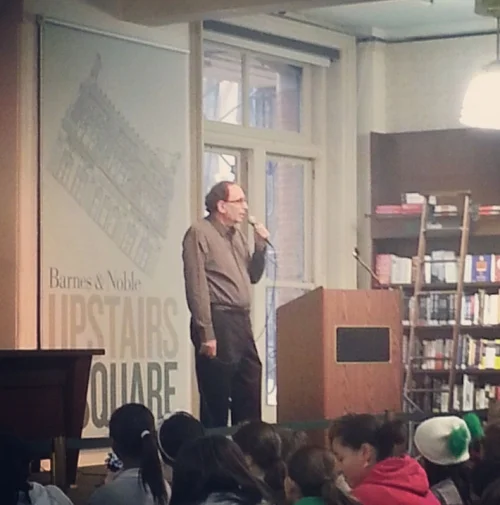Reading an interview with George Saunders in Blip magazine and a run-down of some of the best notes from Susan Sontag's diary up at Brainpickings makes for some pretty hefty writers-on-writing thoughts. Reading each separately can result in joy, inspiration, and serious reflection. But what happens when we force these two writers' thoughts together in fake conversation?
Imagine, if you will, a set not unlike Between Two Ferns. George Saunders waits patiently with his legs crossed, but instead of Susan Sontag joining him (as she obviously cannot), Zach Galifianakis comes out with a copy of Sontag's dairy. He sits, nervously eyeing the ceiling for wasps.
Zach Galifianakis as Susan Sontag: I think I am ready to learn how to write. Think with words, not with ideas ... The function of writing is to explode one’s subject—transform it into something else.
George Saunders: I think what a reader wants is genuine engagement from a writer: that is, he wants the writer to tell the truth as she sees it, and for the form of the telling to somehow be authentic to that which is being told. The reader wants the writer to be brave enough to step away from pre-digested forms or modes, as necessary, in pursuit of beauty.
ZG/SS [looking at his/her nails]: In "life," I don’t want to be reduced to my work. In "work," I don’t want to be reduced to my life. My work is too austere. My life is a brutal anecdote.
GS [frowning, then opening and closing his mouth twice before beginning to speak.]: I think truth, for artistic purposes, is that set of things that we feel deeply, or have felt deeply, but can’t quite articulate, and can’t quite “prove,” and, the direct statement of which feels deficient.
ZG/SS: Ordinary language is an accretion of lies. The language of literature must be, therefore, the language of transgression, a rupture of individual systems, a shattering of psychic oppression. The only function of literature lies in the uncovering of the self in history.
[A crow flies low overhead across the stage. Saunders ducks, covering his head with his arms. Zach/Susan simply glares at the bird's flight, makes to leave his/her chair and follow the bird, then sits down again, shaking head.]
GS [clearing his throat]: Art is ... paying hyper-attention to the things that make reality what it is, resisting reduction, trusting that the truest (and most beautiful) thing that can be said has something to do with the accretion of those small instants.
ZG/SS [with a sudden flailing of arms]: What’s wrong with direct experience? Why would one ever want to flee it, by transforming it—into a brick?
GS: So art—I think one reason we value art so highly is because it really is, and has to remain mysterious—in its intentions and procedures, everything.
ZG/SS: If only I could feel about sex as I do about writing! [ZG/SS stares at GS, breathing noisily through his/her nose. Keeps staring.] That I’m the vehicle, the medium, the instrument of some force beyond myself.
GS [clears throat]: In a larger sense, I think people write better when they’re happy. (Allowing for a broad definition of “happy.”) Maybe “feeling exultant” would be a better way of saying it.
ZG/SS: By refusing to be as unhappy as I truly am, I deprive myself of subjects. I’ve nothing to write about. Every topic burns.
[Saunders coughs and looks anxiously about the room. In doing so, he comes across a beer placed on the table between the chairs. He takes a long pull from it, guzzling, actually, nodding in a certain way while continuing to pull mightily from his beverage. He belches softly. Then swallows hard.]
GS: Writing dictums are the equivalent of replacing the tightwire with a wide plank: a lazy man’s approach. Safer, but less thrilling. There will never be a definition of beauty that helps anybody make some.
[The studio lights start to dim, but not before we catch a scathing look from ZG/SS in George's direction, and George looking about the room in search of a swift exit.]
Image: Caitlin Saunders c/o studio360.org
all quotes ruthlessly stolen from Blip Magazine (George Saunders) and Brainpickings.org
Apologies to Zach Galifianakis















 A Black Balloon Publication ©
A Black Balloon Publication ©